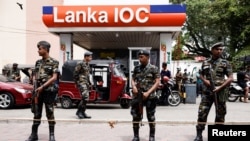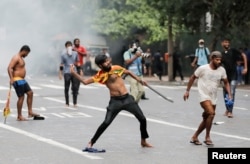Sri Lankan President Gotabaya Rajapaksa said Wednesday he had spoken with Russian counterpart Vladimir Putin to seek credit help in order to import fuel. The island nation is in the midst of its worst economic crisis in seven decades, with the situation triggering anti-government protests.
"Had a very productive telecon with the #Russia President, Vladimir Putin," Rajapaksa said in a tweet. Rajapaksa also thanked Putin for the support the Russian government has extended in the past.
Sri Lanka has struggled to import essentials, leading to shortages of medicine, food and fuel caused in large part by the COVID-19 pandemic. The Reuters news agency cites doctors as saying the entire health system could now collapse.
Many Western Nations have cut off energy imports with Russia in response to its invasion of Ukraine. Sri Lankan Prime Minister Ranil Wickremesinghe said earlier that his country would follow suit and look for other sources first, but it had not been successful. Sri Lanka has already made oil purchases from Russia and indicated that it was willing to make more.
Sri Lanka has turned to tourism as an avenue to generate more revenue. Sri Lanka will also hold road shows in five Indian cities in hopes of attracting more visitors and bringing in more foreign currency from its northern neighbor. In the first five months of the year, Sri Lanka, an island that features rolling hills, pristine beaches, and laidback seaside towns, has seen more than 61,000 Indian tourists, the most from any foreign country, according to Reuters.
Tourism Minister Harin Fernando told reporters, "Sri Lanka must have tourism revenue if it is to emerge from this crisis. That is essential." Fernando said he hopes the country finishes the year with about one million tourists.
Last week, a team from the International Monetary Fund wrapped up a 10-day visit to Sri Lanka, but the two sides did not reach a deal on a bailout package. A statement issued after the visit said, "Sri Lanka is going through a severe economic crisis. The economy is expected to contract significantly in 2022, while inflation is high and rising. The critically low level of foreign reserves has hampered the import of essential goods."
The statement, however, also said, "We reaffirm our commitment to support Sri Lanka at this difficult time in line with the IMF's policies."






